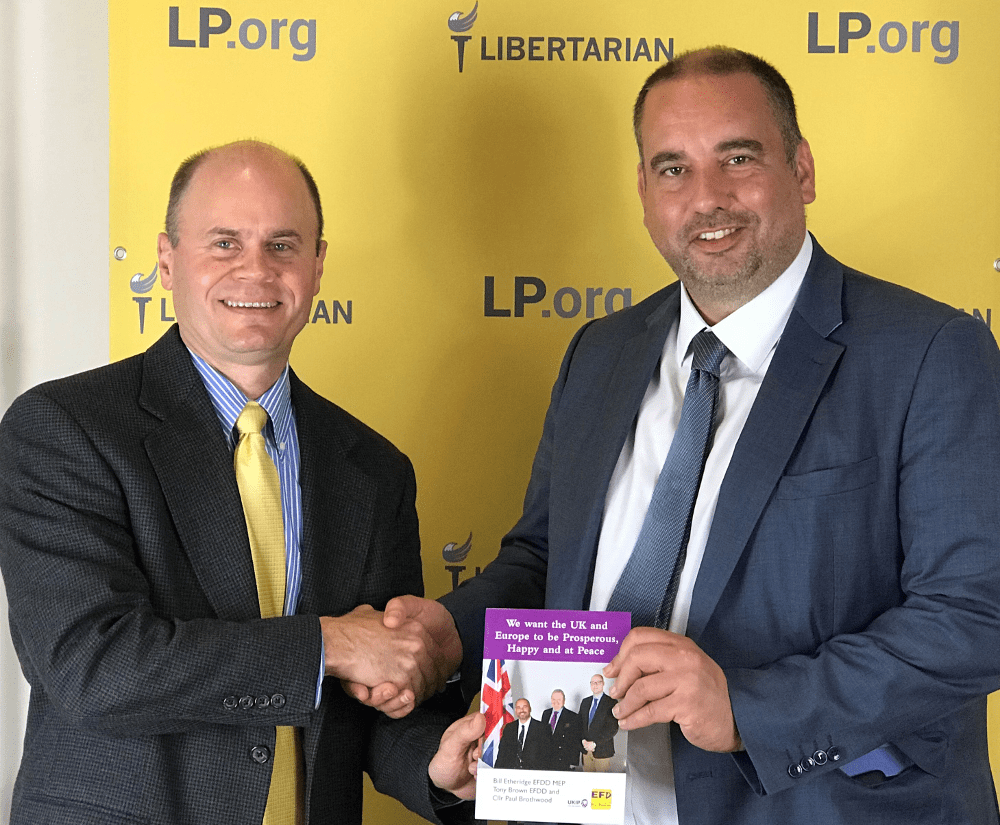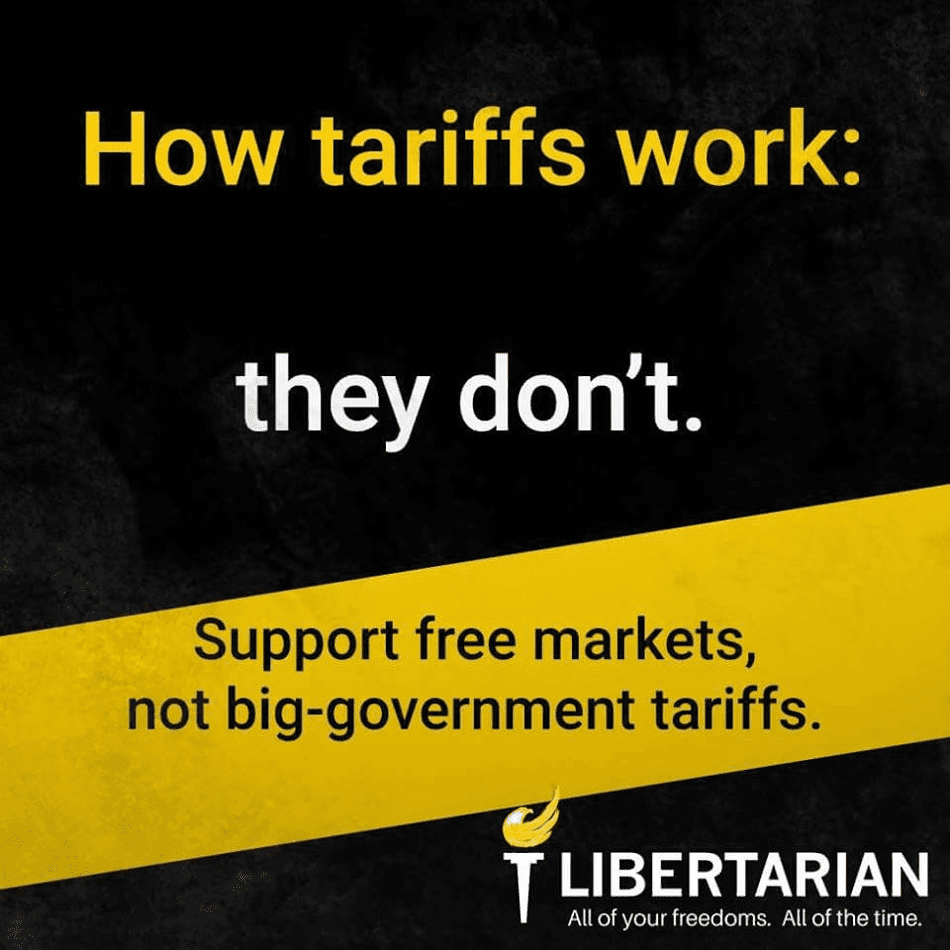The United States, the United Kingdom, and any wise country should immediately implement policies of unilateral free trade. No trade agreements are required, no negotiation or retaliation, no matter what the rest of the world does.
By Bill Etheridge, U.K. Independence Party, Member of European Parliament
and Wes Benedict, Libertarian Party Executive Director
Besides the Declaration of Independence of the United States, another seminal event occurred in 1776. Adam Smith published The Wealth of Nations. As he explained, “In every country it always is and must be in the interest of the great body of the people to buy whatever they want of those who sell it cheapest.” Nothing has happened in the succeeding 242 years to refute Smith’s remarkable insight.
Much of the world seems to have forgotten that lesson today, though, as countries hike tariffs in an ongoing war of punitive retaliation. It shouldn’t be this way, though. By moving resources to more productive and valued uses, trade makes everybody better off. This remains true no matter what kinds of tariffs or sanctions other countries impose. Trade barriers hurt the countries that impose them most of all.
The most important economic principle to help us understand gains from trade is “comparative advantage.” When people specialize in the goods and services they can produce more efficiently, then trade for the rest, they create wealth and grow the economy.
For example, it is theoretically possible to grow bananas in North Dakota with an immense investment in greenhouses and electricity for grow lamps. They would be very expensive bananas, though, compared to those that can be inexpensively imported from Ecuador, where bananas grow like weeds. If a lobby for North Dakota banana producers made enough noise about protecting American banana-producing jobs, and made enough strategic campaign contributions, it could persuade Congress to raise tariffs on bananas from Ecuador. When those prices rise high enough, North Dakota bananas would become competitive at the grocery store — but consumers would pay more to purchase them, and have less money to spend on anything else they want to buy.
Tariffs and other trade restrictions effectively function as higher taxes on consumers in the country that levies the tariffs. Americans are poorer because they pay more for bananas. Ecuadorians are poorer because sell fewer bananas. The politically connected North Dakota banana growers and their lobbyists are better off, but only at the coerced expense of everybody else.
The same logic applies to steel, aluminum, and all the other goods being targeted by the Donald Trump administration’s quack economist Trade Representative Robert Lighthizer. Complaints about an unequal balance of trade are meaningless. If a country sells more to us than we sell to them, the difference comes back as foreign investment in our country. We have a trade imbalance with China, but China is also the largest holder of U.S. Treasury debt and is making direct investments in American factories. The Chinese company Shangdong Tranlin Paper recently built a brand-new paper mill near Richmond, Va., creating many new American jobs. When countries freely trade with each other, the balance of payments includes both trade and investment activity, and these are always in balance.
“Countries with free trade are rich and strong,” said Wes Benedict, executive director of the U.S. Libertarian Party. “Countries with high tariffs are sick, corrupt, and weak. There are some exceptions to that rule, because trade isn’t the only factor that determines wealth, but every country with trade restrictions would be wealthier if they unilaterally eliminated their own tariffs — whether or not other countries follow suit.”
According to Financial Management magazine, the top five countries with the lowest trade barriers are Singapore, Hong Kong, the Netherlands, New Zealand, and Finland. According to Business Insider, the five countries with the highest trade barriers are Iran, Bhutan, Sri Lanka, Nepal, and Pakistan. According to the CIA Factbook, the average per capita income of the top five free-trade countries is $57,520. The average per capita income of the bottom five is only $9,960.
Many people know that most economists think free trade benefits everyone, but they mistakenly think that this has to be a two-way street. Hardly anybody realizes that a country can implement free trade unilaterally and still reap the benefits of free trade regardless of what the rest of the world does. That’s the great news.
“Trade wars are completely unnecessary and completely unwise,” Benedict said. “Either side — or both sides — can win, simply by refusing to impose tariffs. While tariffs are bad, retaliatory tariffs are even worse, wholly foolish, unnecessary, and counterproductive because they exacerbate trade wars. When countries stop trading with each other, this often leads to shooting wars.”
When the United States imposes tariffs on goods from Canada or China, most of the damage happens to the United States. If Canada and China are smart, they would refuse to retaliate. If they were wise, they’d go further and reduce their own tariffs and other trade restrictions to zero, reaping the benefits of lower prices, higher purchasing power, and a growing economy.
Trade barriers also create dependency. If the steel industry only exists in America because of tariffs that price foreign steel out of our markets, then steel lobbyists will forever beg the government to keep or raise those tariffs to protect them. Every business that uses steel will suffer from higher prices and lower quality.

Libertarian National Committee Executive Director Wes Benedict meets with Bill Etheridge, Member of European Parliament from the U.K. Independence Party
When representatives from the U.K. Independence Party (UKIP) recently met with Libertarians at the U.S. Libertarian Party headquarters in Alexandria, Va., the issue of free trade stood out as a priority among all our areas of common concern. The United Kingdom has a long history of supporting free trade, as does the United States, so why are we embroiled in new trade restrictions and threats of still more salvos in the world’s growing trade skirmishes?
“I firmly believe that for a nation to be prosperous, happy, and at peace it must implement free trade,” said Member of European Parliament Bill Etheridge, of the U.K. Independence Party. “A post-Brexit U.K. has a major opportunity to adopt a new approach and lead the way with unilateral free trade. Pressing ahead with unilateral free trade would be a bold, peaceful move that would put us firmly on the map as an open free trading nation once again. For too long the U.K. has been linked to a protectionist block that has forced prices up for consumers and helped impoverish the third world. Let’s use Brexit as a positive mechanism to rectify decades of expensive isolated trade as a result of being a member of the European Union’s protectionist racket.”
The United States should follow suit, and abandon the long-discredited economic fallacies that the Trump administration has resurrected. Mountains of empirical evidence and sound economic theory both show that tariffs and trade wars only serve to impoverish American workers.
“More than anything else, economic fallacies inform this president’s trade views,” wrote Daniel J. Ikenson, director of the Cato Institute’s Center for Trade Policy Studies, about President Trump’s recent actions. “Unlike his predecessors, he sees trade not as a win-win proposition, but as a zero-sum game with distinct winners and losers. Exports are Team America’s points; imports are the foreign teams’ points; the trade account is the scoreboard.”
Trump is using the wrong measurement to keep score.

